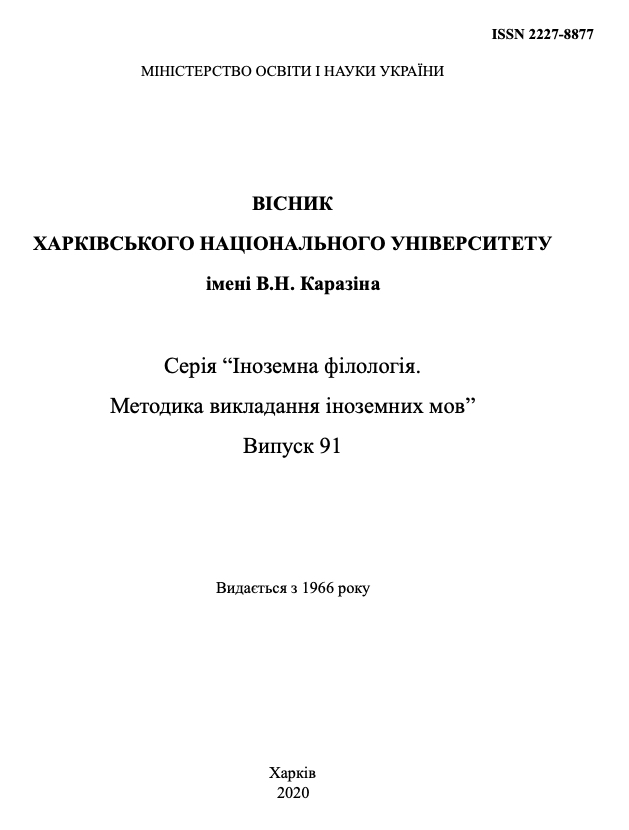Esthetics of poetic discourse
Abstract
Using the examples of poetry texts by Lina Kostenko, the article provides insight into the concept of speech act analysis of poetic text. This concept elaborates J. Searle’s intentionality concept, T. v. Dijk’s thesis on literary speech act and A. Merilai’s pragmatic poetics. Based upon the Jakobsonian notion of self-referentiality, А. Merilai believes that the poetic utterance performs two speech acts that correspond to two contexts of literary perception: 1) the narrow context, or the aspect of content and reference, 2) the broad context, or the aspect of expression and self-reference. Developing this point, I propose to distinguish two kinds of author’s intention in the poetic discourse: referential and aesthetic, which correlate with the two contexts. The aesthetic intention is the author’s mental direction at the created word form with a positive emotional-evaluative attitude toward it. In a poetic text, the author can express: a) content, by correlating words with states of affairs in the external world, i.e. making reference per se; b) his attitude toward this content, i. e. a referential intention; c) his attitude toward the language form, through which the content is expressed, referring utterances to themselves or making self-reference, i. e. an aesthetic intention. Thus, two speech acts are performed simultaneously: 1) referential, based on the reference per se and the referential intention; it involves an illocution and is fictional; 2) self-referential, based on the self-reference and the aesthetic intention. The latter is a subtype of expressive illocution; the author has an illocutionary goal to express a positive emotional-evaluative attitude toward the word form, as well as a perlocutionary goal to affect the reader's aesthetic feelings regarding this form. Further research should establish the pragmatic characteristics of the poetic discourse of different authors, literary directions and genres.
Downloads
References
Alefirenko, N. F., and Chumak-Zhun, I. I. (2008). Kommunikativnaja situatsija kak kognitivno-pragmaticheskij faktor porozhdenija poeticheskogo diskursa [Communication situation as a cognitive and pragmatic factor of poetic discourse generation]. Auspisia. Recenzovan neimpaktovan asopis zamen na oblast spoleenskh vd. eske Budjovice: Vysok kola evropskch a regionlnch studi. 1, 68–73.
Babych, V. I. (2018). Movno-stylistychni, lingvokognityvni ta komunikatyvno-pragmatychni osoblyvosti vyrazhennya lirychnogo Ya u poetychnyx idiodyskursax R. Frosta ta K. Sendberga [Linguistic-stylistic, linguocognitive and communicative-pragmatic features of the expression of lyrical self in the poetic idiodiscourse of R. Frost and K. Sandberg]. Lingvokognityvna poetologiya – Linguistic-cognitive poetology. Kherson: Helvetics, 114–121. (in Russian)
Bart, R. (1989). Izbrannye raboty: Semiotika. Pojetika [Selected works: Semiotics. Poetics]. Moscow: Progress Publ.
Bahtin, M. M. Jestetika slovesnogo tvorchestva [Aesthetics of verbal creativity]. Moscow: Iskusstvo Publ.
Bexta, I. A. (2013). Avtorske eksperymentatorstvo v anglomovnij prozi XX stolittya [Author's experimentation in twentieth-century English prose]. Lviv: PAIS Publ.
Bexta-Gamanchuk, M. P. (2017). Komunikatyvni intenciyi naratora u brytanskij xudozhnij literaturi pochatku XXI st. Diss. kand. filol. nauk [Communicative Intentions of the Narrator in the British Literature of the Beginning of the 21st Century. Kand. philol. sci. diss.]. Lviv, 243 p. (in Ukranian)
Vinogradov, V. V. (1971). O teorii hudozhestvennoj rechi [On the theory of fictional speech]. Moscow: Higher School Publ.
Ermakova, E. V. (2003). K voprosu o podtekste [To the question of subtext]. Neprjamaja kommunikacija – Indirect communication. Saratov: Kolledzh Publ, 87–92 (in Russian)
Zhirmunskij, V. M. (1975). Teorija stiha [Theory of verse]. Leningrad: Sovetskij pisatel' Publ.
Zhirmunskij, V. M. (1977). Teorija literatury. Pojetika. Stilistika [Theory of literature. Poetics. Stylistics]. Leningrad: Nauka Publ.
Jakobson, R. О. (1975). Lingvistika i pojetika [Linguistics and poetics]. Strukturalizm: «za» i «protiv» – Structuralism: pro and contra. Moskow: Progress Publ, 193–230 (in Russian)
Jakobson, R. (1987). Raboty po pojetike: Perevody [Works on poetics: Translations]. Moskow: Progress Publ.
Yacyk, O. P. (2014). Movni aspekty vzayemodiyi obrazu avtora ta tonalnosti tekstu (na materiali prozovyx tvoriv Kurta Tuxolskogo) Diss. kand. filol. nauk [Linguistic aspects of the interaction of the image of the author of the tone of the text (on the material of prose works by Kurt Tukholsky. Kand. philol. sci. diss.]. Kyyiv, 204 p. (in Ukranian)
Dijk, T. van (1980). The pragmatics of literary communication. On text and context. Rio Piedras, Puerto Rico: Editorial Universitaria, pp. 3–16.
Lamping, D. (1993). Das lyrische Gedicht. Definitionen zu Theorie und Geschichte der Gattung. Göttingen: Vandenhoeck&Ruprecht.
Landa, J. Á. G. (1992). Speech act theory and the concept of intention in literary criticism. Review of English Studies Canaria, 24, 89–104.
Lerchner, G. (1987). Literarischer Text und kommunikatives Handeln. Berlin: Akademie.
Merilai, А. (2007). Pragmapoetics as literary philosophy. Interlitteraria, 12, 379–392.
Searle, J. R. (1982). Der logische Status fiktionalen Diskurses. Ausdruck und Bedeutung. Frankfurt/M.: Suhrkamp, pp. 80–97.
Searle, J. R. (1993). Intentionality: An Essay in the Philosophy of Mind. Cambridge: CUP.




